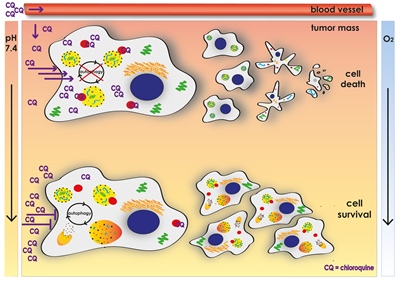 Low pH in tumors counteracts the desired effect of the drug chloroquine, according to a new study from Karolinska Institutet. The results, which are published in the scientific journal Autophagy, might explain possible lack of efficacy of chloroquine in clinical studies.
Low pH in tumors counteracts the desired effect of the drug chloroquine, according to a new study from Karolinska Institutet. The results, which are published in the scientific journal Autophagy, might explain possible lack of efficacy of chloroquine in clinical studies.Chloroquine, a widely used anti-malaria drug, is currently under investigation in clinical trials on cancer patients. It is the ability of chloroquine to inhibit autophagy in tumor cells that has piqued researchers’ interest.
Autophagy is a homeostatic process by which cells eat parts of themselves, so that damaged or unnecessary organelles and toxic proteins are broken down and recycled. In the absence of nutrients, cells resort to autophagy to survive. This way, autophagy helps cancer cells survive in tumor regions that are poor in nutrients and characterized by low oxygen and acidic pH.
Also, tumor cells use autophagy to protect themselves from many forms of anticancer therapies, including chemotherapy. Several studies have shown that inhibition of autophagy often increases chemosensitivity and radiosensitivity in tumor cells. Chloroquine combined with existing cancer treatment is thus considered to be a promising strategy. However, in some cancer models chloroquine seems to be unable to block autophagy, but the underlying mechanisms have not yet been identified.
In the present study, the scientists studied the effect of chloroquine in different cancer cells that were either cultured in acidic pH for a short time or adapted to chronic acidosis. The researchers also studied the effect in tumors grown in mice.
“We discovered that a major consequence of the altered metabolism of tumor cells, the tissue acidification, is responsible for the lack of chloroquine anti-autophagic activity. The results suggest that chloroquine might lack efficacy in patients whose tumors are characterized by acidic regions,” said Angelo DeMilito at the Department of Oncology-Pathology at Karolinska Institutet, principal investigator of the study.
In the context of cancer therapy, the finding may be of importance for the translation of preclinical findings to the clinical setting in patients.
Date: February 11, 2014
Source: Karolinska Institutet
Filed Under: Drug Discovery




